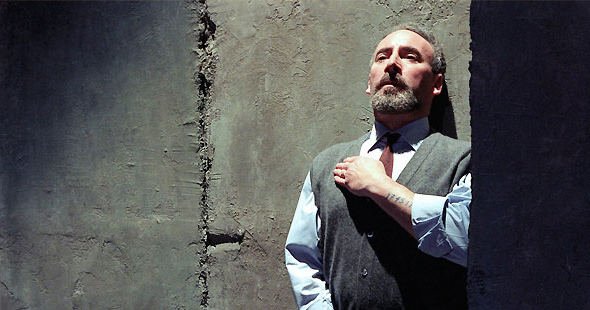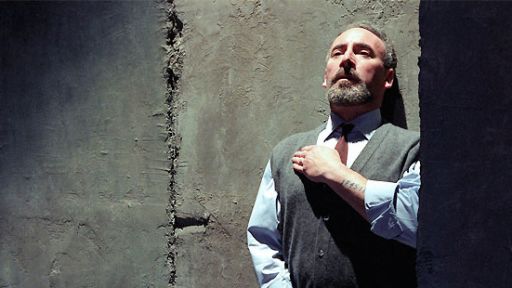When the heirs of Italian chemist, author and Holocaust survivor Primo Levi gave final approval for Antony Sher’s stage adaptation of Levi’s concentration camp memoir Survival in Auschwitz (U.S. title), they insisted the play should never be performed by anyone other than the distinguished actor himself. Their faith proved well placed; audiences and critics from London to Cape Town to Broadway have cheered the portrayal as perhaps the finest of Sher’s career.
Titled PRIMO, that depiction is captured for all time in a special television recording Thursday, April 24 at 10 p.m. (ET) on Thirteen/WNET New York’s GREAT PERFORMANCES on PBS (check local listings). (In New York, the program premieres Thursday, April 17 at 8 p.m. on Thirteen/WNET.) “This is acting of the purest kind,” wrote The London Times, “unadorned by self-pity or visible virtuosity. Primo seems simply to happen, like an eclipse or an earthquake.”
Directed by Richard Wilson, the one-man play, like the book on which it is based, unfolds in controlled, lucid prose, detailing the time the author spent in Auschwitz during the final year of World War II. Levi records how the inmates were reduced to sheep as everything was taken away: “Nothing belongs to us any more. They’ve taken away our clothes, our shoes, even our hair. We are more than stripped bare – we are naked as worms. If we speak they will not listen, and if they listen they will not understand.”
Yet what astounds is the work’s lack of resentment and anger, its chilling acceptance of improbable cruelty and monumental absurdity.
Primo Levi was only 24 when, as a member of the Italian resistance movement, he was arrested in 1943, then transported to Auschwitz in early 1944 when it was learned he was Jewish. He spent 11 months at the death camp before it was liberated by the Red Army in January 1945. He was one of only 22 Italian Jews – there were 650 in his shipment – who left the camp alive.
He wrote many books, the most famous being Survival in Auschwitz (If This Is a Man, European title) and The Truce. Married and living with his elderly mother and mother-in-law, he died in 1987 from a fall from the landing of his apartment building in Turin, most likely a suicide.
The South African-born Sher first read If This Is a Man in preparation for another play he was doing, also set in Auschwitz. “It made an enormous impact on me,” he recalls. “There’s something about his detail, which has something to do with his being a chemist.”
“But it’s also him as a humanist. He somehow takes you by the hand and says, ‘Come, I’m going to guide you around hell now.’”
Following the play’s successful premiere at Britain’s National Theatre in 2004, Sher performed the work in Cape Town, his birthplace, on the 60th anniversary of the liberation of Auschwitz. “Levi lived an amazingly full life,” Sher says. “In the end, his book and my piece are entirely about survival.”
Recorded on stage at London’s Hampstead Theatre, Primo is directed for television by Robin Lough, with Robert Marshall as producer and Michael Linnit as executive producer. It is a production of Heritage Theatre and National Angels.
Known primarily for his many London stage appearances with the Royal Shakespeare Company, Antony Sher is also a frequent film performer (Superman II, Mrs. Brown, Shakespeare in Love). He was appointed a Knight Commander of the Order of the British Empire in 2000.
GREAT PERFORMANCES is funded by the Irene Diamond Fund, the National Endowment for the Arts, the Corporation for Public Broadcasting, public television viewers, and PBS. Special funding for this telecast was provided by the LuEsther T. Mertz Charitable Trust and the Benjamin and Seema Pulier Charitable Foundation.
PRIMO premiered Thursday, April 24, 2008.









